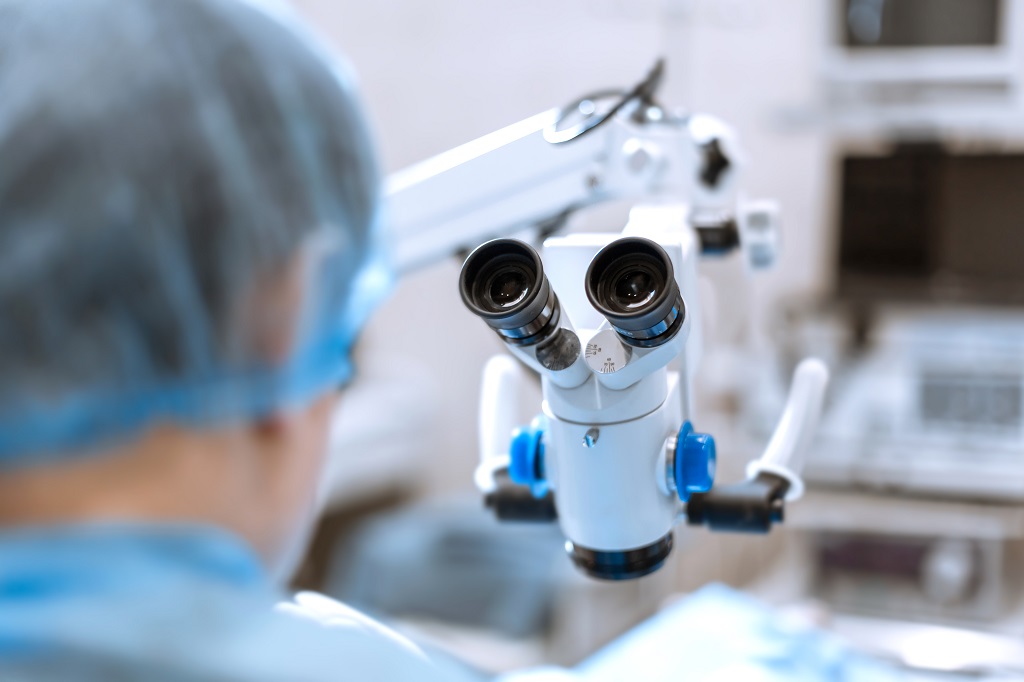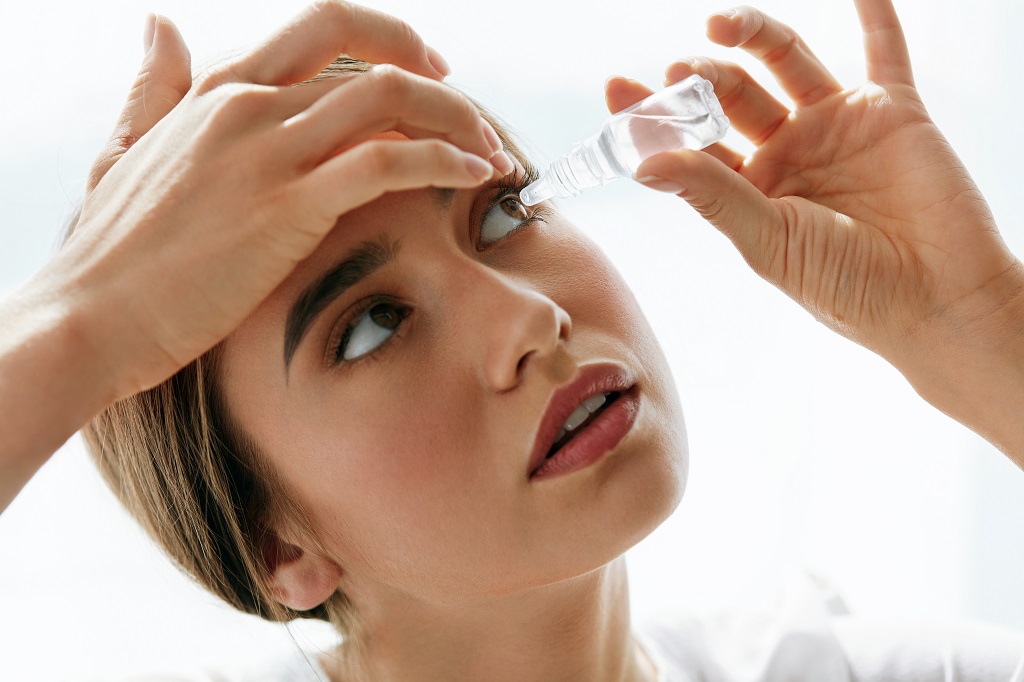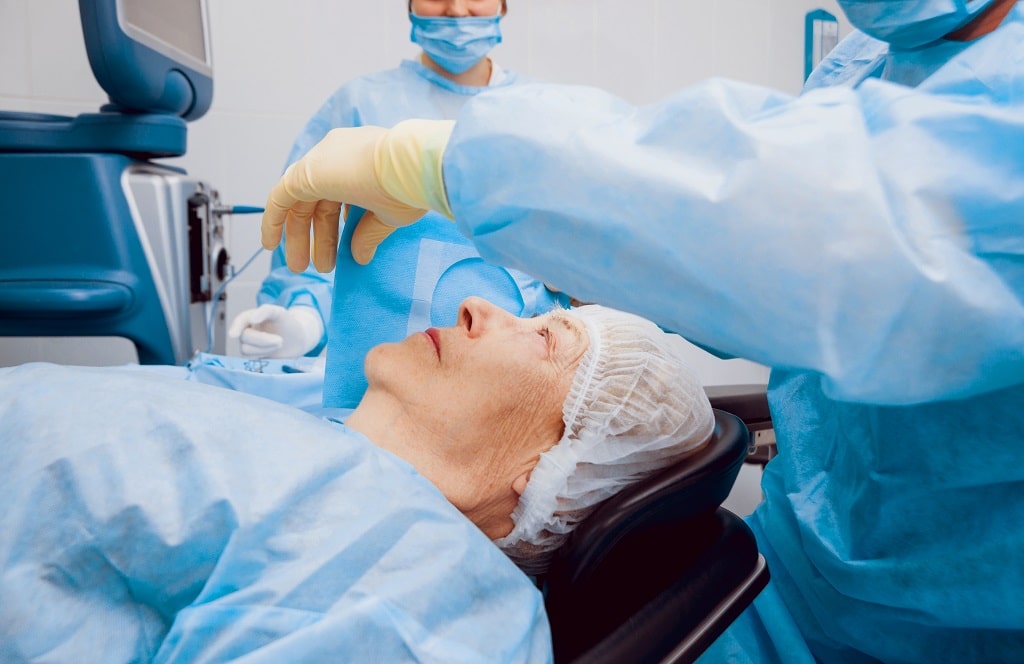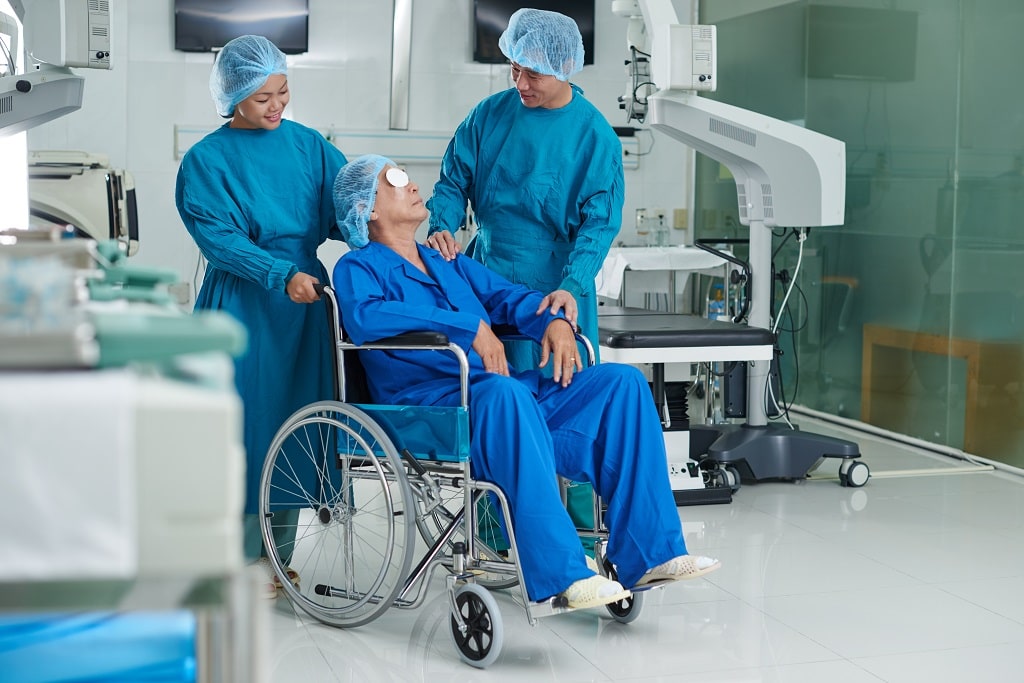

Prior to cataract surgery at Discover Vision Centers, it’s important that you’re aware of the full cataract surgery recovery time, healing process, and ways to facilitate proper recovery from the procedure. An experienced doctor will take your unique circumstances into account and educate you on the best practices for recovering from eye surgery, but you can read on for more general advice about how to recover after cataract surgery and ensure the highest quality of results during your cataract surgery recovery.
During this procedure, your natural lens is replaced with an artificial intraocular lens (IOL). These lenses are made from biocompatible material meaning that they don’t break down over time. Your doctor will work with you to use the right type of IOL that has your specific prescription to best suit your needs. Some patients may choose to take advantage of laser cataract surgery which offers long-lasting benefits. If you’re wondering what to expect after cataract surgery, know that the recovery process for most patients is very tolerable although it is long.
We’ve broken down the cataract recovery time so you know what to expect following the procedure. You’ll be completely healed in no time!
Your doctor may schedule another appointment after 4-6 weeks and again around 8 weeks after your surgery. During these appointments, you’ll have eye exams and finalize any medication tapering that’s necessary during your healing process.

A common question among patients is what is the recovery time for cataract surgery? The full recovery period for cataract surgery typically lasts around 8 weeks, during which you will likely have several follow-up appointments with your eye doctor to ensure proper healing.
While the full recovery period lasts around two months, 9 out of 10 patients are seeing better immediately following surgery. Some patients experience blurry vision as their eye heals, which typically resolves within a few days, provided that the patient is following the proper healing protocol.
Even though you may be seeing clearly within a few days after the operation, it’s important that you follow all of your doctor’s instructions in the recovery period post cataract surgery. Be sure to rest as much as possible in the days following surgery.
Depending on your line of work, you may be able to return to work within a few days. However, it’s important that you avoid certain tasks, such as driving, dusting, gardening, swimming, and vigorous exercise. When in doubt, ask your doctor which activities are safe as you recover after cataract surgery.
The cataract surgery itself should last between 30 minutes and an hour. Your doctor will numb your eyes prior to the surgery, so while you may experience mild discomfort, pain is unlikely. After the operation, your doctor will explain to you the best practices for optimal healing and cataract surgery aftercare.
It’s possible that you’ll have a difficult time judging distances for the first few days after the operation, so you’ll want to move slowly and carefully, especially when walking up or down the stairs. In terms of driving, you’ll want to get specific recommendations from your doctor on when it’s okay to drive again.

What are the restrictions after cataract surgery? There are precautions after cataract surgery that you should keep in mind. For example, if you need to complete some strenuous activities, it is best to do so before surgery.
Avoid bending at the waist and heavy lifting objects that are heavier than 25 pounds
Be sure to consult your doctor for other advice regarding post-operative care and cataract surgery restrictions.
Many patients are able to recover from surgery without major issues, but there’s always a risk that complications develop. You should call your eye doctor if you’re experiencing any of the following symptoms post-cataract surgery:
If you are elderly or female, you have a higher chance of experiencing complications. In addition, there are some conditions that increase your risk of complications:

Cataract post surgery care involves the use of special medicated eye drops, as prescribed by your doctor. These eye drops will facilitate the healing process, and it’s important that you follow cataract surgery post-op instructions closely.
Unless instructed otherwise, you should:
At your follow-up appointment (likely one week to one month post-surgery), your doctor will advise you as to when to stop using the eye drops. Your doctor will also let you know when to apply for new glasses while recovering from cataract surgery.
Consider these steps when administering your medicated eye drops for cataract post surgery care:
Dropless cataract surgery is one of the newest innovations in cataract surgery. This procedure involves the implantation of post operative medications in the eye during the surgery. This means that the patient will not need to administer daily eye drops post-operation, as with regular cataract surgery.

In the case of dropless cataract surgery, there will be:
Ask your doctor if you’re a candidate for dropless cataract surgery.
Research from 2018 suggests that people with diabetes are more likely to develop cataracts, and at younger ages, than people who do not have diabetes. Other vision complications associated with diabetes include diabetic retinopathy and retinal swelling, in addition to changes in the eye’s structure and bleeding inside the eye.
Patients with diabetes make up nearly 20 percent of cataract surgeries. Prior to going in for cataract surgery, it’s important that diabetic patients have no evidence of eye infections and good blood sugar management. In a comprehensive eye exam prior to surgery, your doctor will assess whether you’re a good candidate for cataract surgery. Be sure to ask your doctor about any other specific considerations before the operation.
As long as diabetic retinopathy and other complications are properly monitored prior to and during surgery, the recovery from cataract surgery among diabetic patients is similar to that of nondiabetic patients.

It’s important that you have all your questions about cataract surgery answered prior to the operation. Here are some of the most common questions among candidates for cataract surgery:
Your doctor will provide you with a protective eye shield to wear during sleep, naps, and showering, which will ensure that you do not rub your operative eye or otherwise interfere with the healing process as you rest. It’s normal to feel extra tired after surgery, but the procedure should otherwise not affect your sleep routine. If you’re someone who sleeps on their side, be sure to sleep on your non operative side, so as to minimize pressure on your operative eye during the healing period. Be sure to ask your doctor for specific advice if you’re experiencing pain as you sleep.
Water can affect the eye’s natural healing process after cataract surgery. With this in mind, you should take care to not get water in the eye as you’re washing your face. Your doctor will provide you with a protective eye shield to wear in the shower, and be sure to gently cleanse your face using a soft towel, rather than splashing water directly on your face. The incisions from surgery should heal within one week after surgery, but it’s still important that you avoid getting water in your eyes and close your eyes while washing your face for the duration of the healing period.
As you heal from cataract surgery, it’s best to eat foods that promote general good health and lower inflammation, including leafy greens, fruits and vegetables, lean protein sources, and healthy fats. Foods that generally raise blood sugar are best to avoid, considering that blood sugar dysregulation can drive inflammation and lead to changes in blood pressure inside the eye.
It’s important to avoid all strenuous physical activity for a week after the procedure. Vigorous exercises to avoid include lifting anything above twenty pounds, swimming, and anything considered high intensity, as these activities can increase the pressure within the eye. You will likely be able to resume low impact exercises within a few days, including walking and light stretching. Within a few weeks after surgery, you should be in the clear to resume your regular workout routine. Consult your doctor for specific instructions regarding exercise following cataract surgery.
In preparing for cataract surgery, it’s important that you educate yourself about the healing process and consult an eyecare expert regarding your particular circumstances. Check out our cataract self-test at Discover Vision Centers to find out if cataract surgery is right for you.